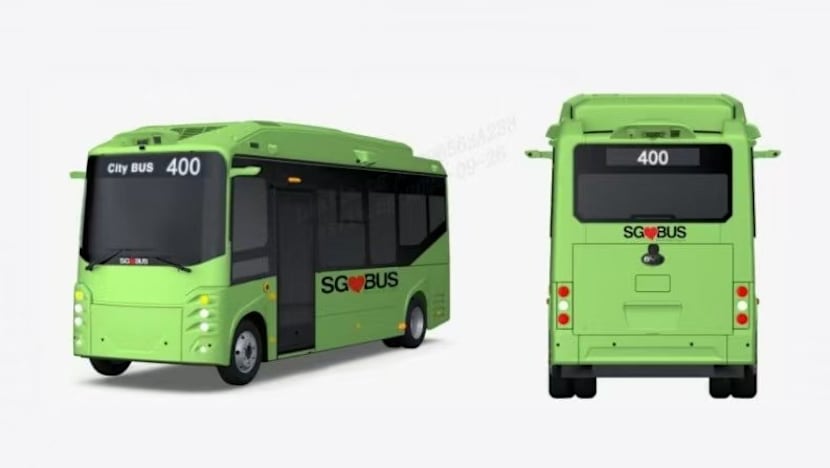LTA awards contract for pilot run of self-driving buses on services 191, 400; consortium includes BYD
From the second half of 2026, six 16-passenger autonomous buses will join the existing fleet of manned buses for an initial period of three years.

Artist impressions of the autonomous buses for pilot deployment. (Image: LTA)

This audio is generated by an AI tool.
SINGAPORE: The Land Transport Authority (LTA) has awarded a contract to pilot autonomous buses on services 191 and 400, with the initial trial period to begin from the second half of 2026.
The contract was awarded to a consortium comprising MKX Technologies, Zhidao Network Technology (Beijing) and BYD (Singapore) for a sum of about S$8.14 million (US$6.3 million).
LTA had received a total of four proposals for the pilot run of the autonomous vehicles (AVs). It evaluated the proposals based on the maturity of the AV technology, as well as the AV developer's track record in local and overseas deployments and its capability to meet the operational needs of public bus services.
"The consortium awarded the contract has proven track records overseas in deploying autonomous bus services on public roads with mixed traffic and remote operations," LTA said in a news release on Thursday (Oct 2).
Zhidao Network Technology, which has deployed autonomous buses in Chinese cities such as Beijing, will provide the AV software and hardware kit, including cameras, as well as the fleet management and remote operations systems, said LTA.
MKX will lead local research and development and project management efforts, while BYD will supply the electric buses.
From mid-2026, a fleet of six 16-passenger self-driving buses will be piloted on public bus services 191 and 400, which run through one-north and Marina Bay respectively, for an initial period of three years.
The buses will operate alongside the existing manned buses to form a hybrid fleet. Fares payable will be the same as those for the public bus service.
The buses will also have facilities similar to existing public buses, such as designated spaces and boarding and alighting ramps for wheelchair and personal mobility aid users.
The pilot will "add to our overall efforts to augment our public transport network and expand mobility options for commuters", said LTA, adding that it will work closely with the consortium to make sure the autonomous buses and their supporting systems are operationally ready.
PILOT DEPLOYMENT PHASES
During the initial phases of the pilot run, a safety operator will be on board the buses at all times, said LTA, adding that it will also monitor the buses in real-time to "ensure consistent self-driving performance and regulatory compliance".
The safety operator will be able to take over control of the bus if necessary, CNA understands.
SBS Transit, the bus operator, will also consider commuters' feedback to review and improve the autonomous bus operations.
"After the autonomous bus has demonstrated its capabilities to operate smoothly and safely, it will progress to the next phase where a
remote operator will monitor the operation continuously in a remote control centre," said LTA.
A customer service officer will also be deployed onboard, in place of the safety operator, to assist commuters.
The consortium will work with SBS Transit to " develop operational concepts and plans" for the hybrid fleet, said LTA.
The consortium will also work with the Singapore Bus Academy to train existing bus captains to take on new roles as safety operators and to learn to operate the autonomous buses competently and confidently, added LTA.
LTA said it will also work with public transport operators and the National Transport Workers' Union (NTWU) to develop training programmes for new roles in the AV industry, including safety operators, customer service officers, fleet managers and other technical functions.
"Through this pilot deployment, LTA aims to assess the technical feasibility of AV technology for public bus services, and gain insights into the operational aspects of running autonomous buses at both service and fleet levels."
LTA added that following this run, it may procure up to 14 more autonomous buses and expand the pilot to more public bus services.
"This phased approach enables LTA to progressively scale up the deployment of autonomous buses, while ensuring bus operations remain reliable and safe.
"AV buses will complement existing buses, allowing us to maintain routes with lower ridership or introduce new services that are hitherto difficult to introduce due to manpower constraint."
In a Facebook post on Thursday, NTWU executive secretary Yeo Wan Ling said that the union will work closely with SBS Transit to "ensure a safe and progressive implementation" of AV technology.
She added that with the award, a recently formed workgroup can now review details such as the training and proficiency requirements for AV-related job roles, including safety operators and remote operators, with "greater clarity".
"This is crucial to address any skills gap that our existing workers may have so they can transition smoothly into these new roles."
The workgroup is co-chaired by LTA and the National Trades Union Congress - of which NTWU is an affiliated union - to look into the workforce's readiness for AVs, including implementation details of near-term AV deployment and its impact on workers.
"Together, we will ensure that our bus workforce is adequately prepared to work in an environment where manned and unmanned platforms interoperate to deliver safe and reliable public bus services," she said.










.jpg?itok=ZqFafVWl)







